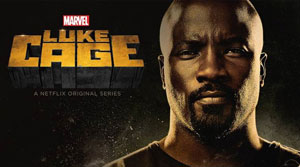Burning slowly like a 1970s urban street thriller, “Luke Cage” feels more comfortable in its suits and shades and bullet-riddled sweatshirts than it did in its first season. Bushmaster (Mustafa Shakir) and his Jamaican cohorts – all of the actors doing a wonderful job with the dialect – are entertaining antagonists, but we slowly realize the uber-villain of Season 2 (2018, Netflix) is slick Harlem councilwoman Mariah Stokes Dillard (Alfre Woodard).
The costs of holding on to power
Cheo Hodari Coker’s series – after many examples illustrating what powerful people can get away with – morphs into a smart meditation on the cost of holding on to power, and how a few bad decisions can see that power spiral away.
While it has become a cliché to complain that 13-episode Netflix MCU seasons should be condensed into eight episodes or so, “Luke Cage” Season 2 consciously wallows in the morass of Harlem. It’s set in present day, but it’s timeless because the issues of drug-running, gun-running, the power of criminals and the powerlessness of the law have been explored in this genre for decades, so the old-school pacing becomes at least forgivable and perhaps outright appropriate. And when the show gives us an entire blues or rap song in Harlem’s Paradise, usually toward an episode’s end, I’m outright happy it’s taking its time.

“Luke Cage” Season 2 (2018)
Netflix, 13 episodes
Creator: Cheo Hodari Coker
Stars: Mike Colter, Simone Missick, Theo Rossi
At first, the central clash is between Mariah and Bushmaster, dating back to Mariah’s relatives screwing over Bushmaster’s relatives in their rum-producing partnership on the island of Jamaica a generation prior. Luke (Mike Colter, oozing cool in a way that would make Richard Roundtree proud) has now embraced his status as Harlem’s hero, but he struggles with how to use that identity for the good of the people.
In his handful of fights against Bushmaster – who likewise has near-invincible superpowers, in this case through herbal medicine rather than science – there’s a sense that the showrunners are giving us the action we want from a superhero series. But late-season twists reveal that this is really a character piece, and the finale is a gripping “fall of the gangster” epilogue about the true villain.
Here are my rankings of the 13 episodes of what is unfortunately the final season of “Luke Cage”:
1. “They Reminisce Over You” (episode 13, written by Cheo Hodari Coker)
This is a different, less bombastic kind of finale, but it’s great for that reason. Bushmaster simply leaves town, and real villain Mariah continues to kill (her own allies this time!) even though she’s behind bars. I didn’t know where this episode was going, and was satisfied to get a robust picture of the villain’s motivations. I’ve loved to hate Mariah for two seasons, and Woodard deserves credit for pulling that off. Mariah mostly exudes confidence, but we also see her crack in tense situations.
It makes perfect sense that Tilda (Gabrielle Dennis) would be the one to off her mother, but the way she does it is ingenious – with a kiss. And when Luke gets Harlem’s Paradise in Mariah’s will – he’s the only one who loves Harlem as much as she did – Tilda’s hurt expression is a cue that she was to be the next villain. Season 3 would’ve been like “Angel” Season 5, with Luke in a position to change things from the inside; but as we have seen, power is always precarious.
2. “The Creator” (11, Nicole Mirante Matthews and Matthew Lopes)
Finally but satisfyingly, we learn the backstory in 1980s Jamaica of how the Stokes family – namely Mama Mabel (LaTanya Richardson Jackson) – betrayed Bushmaster’s family, and we see that Bushmaster is not merely a lesser evil in this feud, he’s arguably not a villain at all. I can’t think of any other show that believably recasts a Big Bad like this.
Indeed, Luke and Bushmaster simply talk at the morgue, an unspoken truce – and even some understanding – between them. Meanwhile, the moral divide between former lovers Shades (Theo Rossi) and Mariah reaches its breaking point when Shades can’t bring himself to kill the lone survivor of the Mariah-led restaurant massacre. It’s a great twist when he turns himself in to the police.
3. “The Main Ingredient” (10, Akela Cooper)
Even by this show’s standards, it’s shockingly violent when Mariah’s gang shoots up the Jamaican restaurant, murdering all the innocent bystanders. At this point, “Luke Cage” becomes more thematically resonant as Shades begins to consider splitting from Mariah over this breach of the “rules” of crime.
Other good stuff includes Misty (Simone Missick) and fellow officer Nandi (Antonique Smith) sparring over whether to cut a deal with Mariah, and Luke and Danny Rand (Finn Jones) teaming up in a purple-lit fight scene in Bushmaster’s nightshade-production facility. The episode ends with Luke and Danny sitting in Genghis Connie’s Too, talking over plates of mu-shu pork. With both “Luke Cage” and “Iron Fist” canceled, this is as close as we’ll get to “Power Man and Iron Fist” on TV.
4. “Can’t Front on Me” (12, Aïda Mashaka Croal)
This is the traditional “finale” before the unorthodox finale to come. By this point, it’s so clear that Mariah is the greater evil that I wonder why Luke doesn’t let Bushmaster kill her. Even he’s wondering that, when he says to Bushmaster: “Why don’t you two kill each other so I can get some sleep?” Even with Luke inexplicably protecting Mariah, the battle with five major players in the safe room of Harlem’s Paradise is great. While Shades recounting all his violence over two seasons of TV in his deposition isn’t strictly necessary, it’s never boring to watch Rossi, who can convey a feeling with a mere tilt of his head.
5. “On and On” (7, Matthews)
Usually the live-music numbers are interludes where we can relax, but here we get the smoothest takeover of the club imaginable, as Bushmaster and his team pull it off while the band is playing. Luke and his father, James (Reg E. Cathey, who died during Season 2’s filming), tiptoe toward reconciliation even as we learn more of the historical reasons for Bushmaster’s revenge spree.
Shades shooting his friend Che (Thomas Q. Jones) – the snitch in their ranks — is surprising and tragic. As Luke and Misty prepare to fight the Jamaicans, they argue about which one is the sidekick: “It’s my show,” Luke says, settling the matter. (OK, it’s cheesy, but at least they resist having Luke wink at the camera.)
6. “Straighten It Out” (2, Cooper)
The blues singer announces “You’re gonna know my name,” and fittingly, this is the series’ most confident episode to this point. Luke’s issues with his father parallel Tilda’s mother issues with Mariah. Humor is never too far from the surface, though, as we see ESPN pundits comment on Luke’s workout and compare him to Usain Bolt. The notion of Luke as a pop-culture icon is present through the season with DW (Jeremiah Richard Craft) selling Cage merch from the barbershop. The product placement makes sense in the narrative while almost making me want to stock up on Cage collectibles.
7. “For Pete’s Sake” (9, Matt Owens and Ian Stokes)
Most of this episode takes place in an empty Rand office building, and while that’s the extent of the “Iron Fist” crossover, there’s lots of good stuff here, including a great fight sequence highlighted by Luke jumping out of a high window and wrapping a gun around a thug’s neck.
As Luke’s relationship with his father improves – in a nice chat where Cathey does his best work as the flawed but mellowed dad – Tilda’s relationship with her mother turns horrifying. In a shocking monologue, Mariah reveals that Tilda is the product of rape and that she has never loved her. Further embracing her true nature, Mariah kills many of the intruding Jamaicans herself.
8. “All Souled Out” (5, Stokes)
Mariah is in fine form as a slimy “lesser evil” politician. As she speaks about her Family First Initiative – to be funded by her ill-gotten gains, and to provide a PR front for more of the same – we see portraits of real-world famous black women on the walls. Living legends are also ripe for appropriation, as RayRay (Chaz Lamar Shepherd), who has a Luke Cage museum in his law office, hires Luke to be himself at a party. He shoots Luke as a demonstration of Luke’s thick skin, for the sake of entertaining his clients.
9. “I Get Physical” (4, Lopes)
With two full blues numbers by a good band, I’m thinking it’s a shame Mariah isn’t content to simply run a successful music club. Luke’s long odds are further outlined in this episode: Fish (Ron Cephas Jones), the barbershop chess player who serves as the Yoda of the streets, is his latest friend to leave town, and a police officer laughs when watching the video of Bushmaster beating up Luke.
10. “The Basement” (6, Croal)
This episode offers the spectacle of Luke and Bushmaster fighting atop a high bridge, but I actually like the quieter moments of Luke and RayRay talking in an abandoned movie theater while hiding out. Settings like this illustrate the state of the true Harlem everyone is fighting over, and provide a nice contrast to the glitzy Harlem’s Paradise. Here, we suddenly learn of the gay relationship between Shades and Che, nicely unveiled in a scene where they’re preparing for an ambush, sitting back to back.
11. “If It Ain’t Rough, It Ain’t Right” (8, Nathan Louis Jackson)
Rossi is always intensely watchable as Shades, but he does particularly strong, subtle work here. Being grilled by police officers, Shades denies killing Che, but we see his inner pain. I suspected the writers might play up a relationship between Luke and Tilda, but that fizzles out here.
12. “Wig Out” (3, Owens)
Everyone knows Luke is bulletproof, but the villains always have to see for themselves; such is the case as Cage mows through Bushmaster’s henchmen. After beating up Cockroach (Dorian Missick), Luke develops a taste for violence, inspiring girlfriend Claire (Rosario Dawson) to depart and forcing him to navigate his own way. He has at least one ally, though: Adjusting to the loss of an arm, Misty gets her confidence back in a bar fight, and it’s nice to see her palling around with “Iron Fist’s” Colleen (Jessica Henwick).
13. “Soul Brother No. 1” (1, Coker)
The season premiere sets the stage with a Luke and Claire who are committed to being Harlem’s protectors, thick Jamaican dialects for Bushmaster and his group, and such bad blood between Luke and his father that it makes Jessica Jones and her mom look like the Gilmore girls. In an early illustration of Season 2’s exploration of racism within the same race (this series is not for those who struggle with the n-word and other slurs), Cockroach muses that he wants Harlem to be “black black.”


